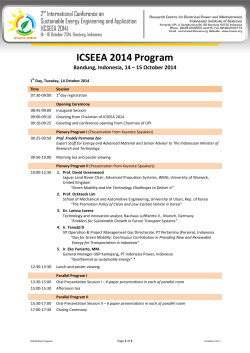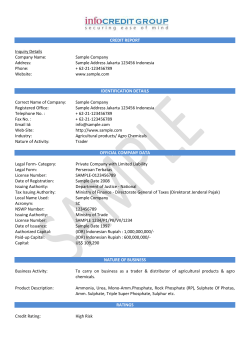
Global Markets Group
Global Markets Group Economic and Markets Research – Snapshot: GDP 2014 Report Economic Research February 2015 Economy Posted at Slowest Pace since 2010 Author: Juniman – Chief Economist GDP Review Indonesia economic growth in 2014 posted 5.02% (slowest pace since 2010), slowing from 5.58%2013 (base year 2010=100), driven by slowing growth of private consumption, government spending, investment and exports. Furthermore, private consumption slowing of 5.38% in 2013 to 5.14% in 2014 is due to the impact of fuel price hike. The slowdown in private consumption is also reflected in the slowdown in sales of cars and motorcycles. In 2014, car sales growth contracted 1.78% worse than 10.18% in 2013. Meanwhile, sales of motorcycles also grew only 1.59% in 2014 slower than 9.62% in the previous year. Slow down of export growth to 1.02% in 2014 from 4.17% in 2013 is caused by slow recovery of the global economy that has an impact on slowing global demand. The export slowdown is also the impact of government policy which ban of the raw minerals exports and the declining commodity prices. Meanwhile, Slowing Indonesia's economic growth in 2014 is also supported by the slowing growth of investment which grew 4.12%, down from 5.28% y-o-y in 2013. Government spending was also slowing growth from 6.93%% in 2013 to 1.98% in 2014 as caused by poor absorption of the government budget and the presence of government spending cuts. In the other hand, import was improving growth to 2.19% in 2014 from 1.86% in 2013 due to high oil import. Based on the industry, Indonesia's economic was slowing in 2014 mainly due to the slowdown in Mining & quarrying sector, Water supply, waste management, waste and recycling sector, Transportation and warehousing sector, Provision of accommodation, eating, and drinking sector, Financial services and insurance sector, Real estate sector, and Education services sector. Furthermore, mining & quarrying sector slowdown of 1.74% in 2013 to 0.55% y-o-y in 2014 due to the impact of government policy which ban of the raw minerals export and the declining commodity prices. The Water supply, waste management, waste and recycling sector grew 3.05% 2014, slowing from 4.06% y-o-y in 2013. Furthermore, the Transportation and warehousing slowdown of 8.38% y-o-y in 2013 to 8.00% y-o-y in 2014 due to fuel price hike. Provision of accommodation, eating, and drinking sector was slowdown of 6.80% 2013 to 5.91% in 2014. Financial services and insurance sector slowdown of 9.09% in 2013 to 4.93% in 2014 at mainly come from a slowdown in the growth of the banking sector due to the tight monetary policy by Bank Indonesia. Moreover, real estate sector slowdown of 6.54% in 2013 to 5.00% in 2014 due to the impact of tight monetary policy by Bank Indonesia and fuel price hike. Education services sector slowdown of 8.20% in 2013 to 6.29% in 2014 due to the impact of fuel price hike. GDP Outlook Even though Indonesia's economic growth slowed to 5.02% y-o-y 2014, we expect growth in the Indonesian economy will improve in 2015. This is caused by strong government consumption and investment. Furthermore, in accordance with robust household consumption, expanding government consumption and investment in line with greater fiscal capacity to support productive economic activities, including infrastructure development, will catalyze high economic growth. Moreover, the increase in investment is mainly supported by the government makes it easy for investors to make investment licensing services of the door under Investment Coordinating Board. Meanwhile, we expect exports will start to rise in 2015 due to the improvement economies of Indonesia's major trading partners such as India, US, Singapore, and the UK. We expect Indonesia's economic growth reached 5.50% y-o-y in 2015. Market Implication FX Markets The slowing of Indonesia's economy in 2014 gives negative sentiment of Rupiah. Furthermore, the pressure of Rupiah still occur as US Fed's plan to normalize monetary policy which impact on the strengthening of the USD against all global currency including Rupiah. In addition, the pressures on Rupiah due to high demand for the USD in the domestic market for corporate debt payments and oil imports. With this condition, the Rupiah is still under pressure in the near future. Bond Markets Indonesia's economic slowdown is also a concern of investors in the bond market in Indonesia. Furthermore, investors will look at issues relating to the normalization of monetary policy by the Fed and the increasing tension between the Greece Government with the ECB which can lead to turmoil in global financial markets. In addition, due to soaring investors bought in Indonesia bond market in the last few weeks making yields fell fast and far below the benchmark rate (BI Rate). The situation is prone to profit-taking. By looking at these conditions, we expect strengthening room in Indonesia bond market is limited. Changes in Consumer Price Index (Percent) Main Driven of Inflation by Component PT Bank Internasional Indonesia – Global Markets Group 1 Share of GDP 1Q2014 by Expenditure (%) Year on Year GDP Growth by Expenditure Indonesia GDP Growth by Expenditure Share of GDP by Expenditure (%) 20.000 (24.5) Household Consumption 56.1 10.000 Non-Profit Institutions Servings Households Consumption Government Consumption 23.7 0.000 2014 2013 2012 2011 2010 2009 -10.000 1.2 9.5 5.000 -5.000 Investment 34.0 15.000 Exports -15.000 Imports GDP Household Government Investment Exports Imports Non-Profit Institutions Servings Households Source: BPS & BII Economic Research Source: BPS & BII Economic Research Indonesia’s Automotive Sales Indonesia’s Consumer Activity Index Indonesia's Automotive Sales Car (LHS) Thousands Units 140.0 Indonesia's Consumer Activity Motorcyle (RHS) Thousands Units 800.0 700.0 600.0 500.0 400.0 300.0 200.0 100.0 0.0 120.0 100.0 80.0 60.0 40.0 20.0 0.0 PT Bank Internasional Indonesia – Global Markets Group Retail Sales Index Consumer Confidence Index 180.000 160.000 140.000 120.000 100.000 80.000 Jan-15 Dec-14 Nov-14 Oct-14 Sep-14 Aug-14 Jul-14 Jun-14 May-14 Apr-14 Mar-14 Feb-14 Jan-14 Dec-13 Nov-13 Oct-13 Sep-13 Aug-13 Jul-13 Jun-13 May-13 Apr-13 Mar-13 Feb-13 Jan-13 Dec-12 Nov-12 Oct-12 Sep-12 Aug-12 Jul-12 Jun-12 May-12 Apr-12 Mar-12 Feb-12 Jan-12 Dec-11 Nov-11 Oct-11 Sep-11 Aug-11 Jul-11 Jun-11 May-11 Apr-11 Mar-11 Feb-11 Jan-11 Dec-10 Nov-10 Dec-14 Jul-14 Feb-14 Sep-13 Nov-12 Apr-13 Jan-12 Jun-12 Aug-11 Mar-11 May-10 Oct-10 Dec-09 Jul-09 Feb-09 Sep-08 Nov-07 Apr-08 Jan-07 Jun-07 Aug-06 Oct-05 Mar-06 Source: CEIC & BII Economic Research 200.000 Source: CEIC & BII Economic Research 2 Macro Economic Indicators Indicators 2011 2012 2013 2014F 2015F 2016F Inflation (%YoY) Core Inflation (%YoY) Exchange Rate Eop (Rp/US$) Exchange Rate Avg (Rp/US$) Curent Account (% GDP) Fiscal Balance (% GDP) Interest Rate BI Rate (% p.a) Time Deposit 3 month (% p.a) Lending rate working capital (% p.a) 3.79 4.34 9068 8773 0.20 -1.14 3.65 4.40 9670 9419 -2.78 -1.77 8.08 4.32 12189 10564 -3.33 -2.23 8.36 4.93 12440 11885 -2.95 -2.20 5.01 4.31 12500 12514 -2.50 -1.80 4.80 4.11 12200 12260 -1.80 -1.60 6.00 6.81 12.18 5.75 5.76 11.50 7.50 7.61 12.12 7.75 9.43 12.86 8.00 9.53 13.19 8.25 9.72 13.38 24.67 24.21 21.41 33.21 24.59 19.07 2.17 894 16.93 8013 8.67 117.9 6.56 110.1 6.17 24.05 19.87 23.21 27.39 23.08 15.81 1.87 1116 24.84 7064 -11.83 145.1 6.14 112.8 6.03 26.53 13.67 20.43 34.95 21.60 13.60 1.77 1230 10.18 7744 9.62 172.4 6.25 99.4 5.58 17.19 10.41 12.14 14.13 12.15 13.30 2.50 1208 -1.78 7867 1.59 160.8 6.12 111.9 5.02 12.55 9.73 18.12 20.45 16.41 14.24 3.00 1154 -4.46 7558 -3.93 156.5 6.50 116.6 5.50 15.47 12.70 20.45 22.95 19.11 14.44 2.50 1250 8.29 8104 7.23 n.a 5.74 119.9 6.02 Credit Growth (% YoY) Property Credit Consumer credit Working Capital Credit Investment Credit Total Credit Deposit NPL Commercial Banks (%) Car Sales (1000 Units) Car Sales Growth (%) Motorcycle Sales (1000 Units) Motorcycle Sales Growth (%) Government Capex (Rp tn) Unemployment Rate (%) International Reserve (US$ bn) GDP Growth (%) Note : the red numbers are forecast Source : BII Economic Research BII ECONOMIC RESEARCH DIVISION Sentral Senayan III, 8th Floor Jl. Asia Afrika No. 8, Gelora Bung Karno - Senayan Jakarta 10270, Indonesia Ph: +62 (021) 29228888 Fax: +62 (021) 29228849 Juniman Chief Economist Juniman@bankbii.com +62-21-229228888 (29682) Anup Kumar Fixed Income Analyst AKumar@bankbii.com +62-21-229228888 (29602) Myrdal Gunarto Industry Analyst MGunarto@bankbii.com +62-21-229228888 (29684) DISCLAIMER The information contained has been taken from sources we deem reliable. PT Bank Internasional Indonesia and/or its affiliated companies and/or their respective employees and/or agents disclaim any liabilities including the accuracy or completeness of the information and opi nions contained in this report or as to any information contained in this report or any other such information or opinions thereof. The information contained in this report is not to be taken as any recommendation made by PT Bank Internasional Indonesia or any other person to enter any agreement with regard to any investment mentioned in this document. This report is prepared for general circulation. It does not have regards to the specific person who may receive this report. In considering any investments you should make your own independent assessment and seek your own professional financial and legal advice. ANALYST CERTIFICATION Each contributor to this report hereby certifies that all the views expressed accurately reflect our views about the companies, securities and all pertinent variables. It is also certified that the views and recommendations contained in this report are not and will not be influenced by any part or all of our compensation. PT Bank Internasional Indonesia – Global Markets Group 3
© Copyright 2025










